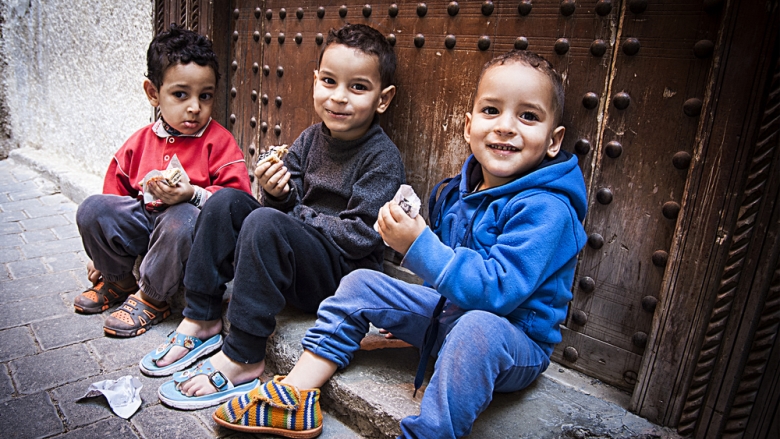Morocco early childhood development prospects
Lack of Early childhood programs perpetuates inequality
While good quality ECD is important for all children, it is essential to support the development of children in disadvantaged settings. Indeed, various studies have demonstrated how investment in ECD can help reduce inequality and break the cycle of poverty.
As Nobel laureate Professor James Heckman put it, “Children raised in disadvantaged environments are not only much less likely to succeed in school or society, but they are also much less likely to be healthy adults.” Effective early childhood programs can lead to improved economic prospects of children by helping them gain the foundational skills they need to be more productive in the future workforce.
Inequality in access to quality ECD has many faces in Morocco and reflects significant inequality gaps between the most well-off and the most disadvantaged children. The first step in ECD is providing the support to help babies simply survive infancy; in Morocco 25 out of every thousand babies die during their first month of life. Nutrition, another critical component of ECD, also reveals important gaps as reflected by a 2004 figure, showing that 23% of children under 5 were stunted and 10% underweight.
Access to pre-school education has significantly increased over the past decades yet remains a luxury to many disadvantaged Moroccan children. Pre-school has developed over the years mainly in urban areas and on the initiative of the private sector, providing an educational alternative to more traditional structures including the Msid, the Koutab and other institutions. These structures are still widespread throughout the Kingdom, with 60% enrollment in 2015-2016, and teach children the principles and moral values of Islam as well as the basics of literacy and numeracy. As a result of the rapid expansion of preschool structures (traditional and private structures combined), enrolments in preschool have substantially increased over the past decade (+10% increase between 2001 and 2013 for children aged 4-5).
Yet despite progress in access to health and pre-primary education, many Moroccan children are still falling short of their full potential for healthy development. First, the existing network of preschools is still scarce, especially in rural areas where they are clearly most needed. In 2015-2016, only 43% of Moroccan children aged 4-5 were enrolled in preschool and only 27.9% in rural areas. Poorest Moroccan children are much less likely (16%) to benefit from development activities compared to the richest (58%). Secondly, the quality of preschool education varies tremendously, and the lack of an effective quality-assurance mechanism at this level hinders substantial improvements in quality and consistency.
Research has also demonstrated the importance of parents’ involvement in their children’s cognitive development. An OECD study found that parents who play and talk to their children from their early days, who read books to them and help them with their homework, have better chances that their children will do well at school. In Morocco, such cognitive stimulation from parents is rare, especially in disadvantaged families, due to parents’ lack of education, large household size, or even a lack of information among parents about the behaviors that can help their children succeed.
More ECD investments key to enhanced human capital
As emphasized in the recent World Bank Morocco Economic Memorandum, supporting early childhood development in Morocco is an essential investment to yield better human development outcomes. ECD not only influences individuals’ personal, social and professional development but also determines a whole country’s growth prospects.
ECD is multi-sectoral by nature. As such, it relies on the existence of an integrated, multi-sectoral and comprehensive early childhood development strategy that can be implemented in a coordinated and effective manner in the areas of health, education, nutrition, and social protection. Moreover, focusing on quality ECD rather than on a mere increase in enrolments is critical to providing educational and development settings adapted to supporting the holistic development of children, particularly those at risk of social exclusion.
Morocco will reap long term economic and human returns by establishing quality standards of early childhood care and education, which will need to be set, monitored and enforced across the country. This will, in turn, help to protect and enhance children’s development and ensure children have equal opportunities to flourish regardless of their circumstances. Finally, awareness-raising is instrumental to achieve successful ECD outcomes: informing and engaging parents on the need to stimulate their children, interact with them, and carefully monitor their cognitive skills from birth to the age of 5 are integral parts of ECD programs.
The need for greater ECD investments is a no-brainer to build the human capital that can serve a country’s development objectives, contribute to greater productivity and improve people’s living conditions. Education, a key pillar of early childhood development, is particularly a proven vehicle for long-term human development and inequality reduction.

